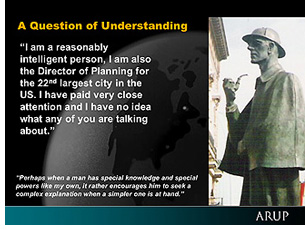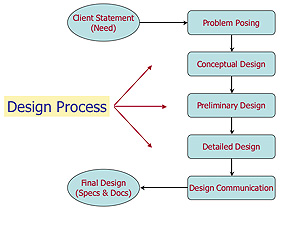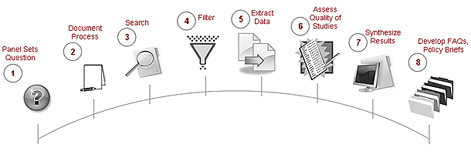|
Summit Releases Findings on Culture, Agendas for Architecture Research
 Summary: A new site on AIA.org presents the key findings of the AIA 2007 Board Knowledge Community Research Summit, held March 23–24 in Seattle. A group of 39 practitioners and educators explored the culture of research and drivers of change to identify emerging research agendas in architecture and elevate the importance of research in the profession. The new Web site offers both videos and transcripts of the two keynote presentations, written and graphic statements from the summit’s five-person panel discussion, and the results of breakout sessions that developed agendas for social, technological, environmental, cultural, organizational, and design research. Summary: A new site on AIA.org presents the key findings of the AIA 2007 Board Knowledge Community Research Summit, held March 23–24 in Seattle. A group of 39 practitioners and educators explored the culture of research and drivers of change to identify emerging research agendas in architecture and elevate the importance of research in the profession. The new Web site offers both videos and transcripts of the two keynote presentations, written and graphic statements from the summit’s five-person panel discussion, and the results of breakout sessions that developed agendas for social, technological, environmental, cultural, organizational, and design research.
 Top research priorities Top research priorities
In addition to framing research into six agendas, the summit participants considered the AIA’s four domains of knowledge:
- Leadership
- Practice
- Design
- Building Performance.
The top priorities focus on:
- Demographic measures for public health and well being
- Energy consumption and better metrics for building performance (e.g., daylighting versus artificial light)
- Ergonomics for users of particular facilities (e.g., movement patterns, next-generation flexible facilities)
- Improvements to defining the functional requirements of facilities
- Integrated practice and collaboration models
- Limitations on water availability for buildings
- Relationship of buildings to community identity, heritage, and the broader ecological function (i.e., urban form and wellness)
- Sustainability (e.g., global demand for resources, climate change mitigation, carbon-neutral buildings, regenerative/disassembly buildings)
- Urbanization (i.e., impacts of aging infrastructure, optimizing conditions for human development).
Long-range Goals
The summit also set the following goals for architecture research:
- Define and develop standard research criteria, techniques, and vocabulary
- Increase university research capacity and funding opportunities
- Integrate research and "evidence-based design" in education and practice
- Evaluate outcomes of currently funded architectural research
- Establish official recognition by the National Research Council
- Establish a unified research database
- Promote linkages between research and practice
- Encourage research initiatives at all AIA component levels.

eClassroom programs available
In addition to the information presented on the new site, the AIA eClassroom distance learning program has made available the keynote address as classes offering CES credit:
Drivers of Change: Gary Lawrence, principal global leader for sustainable urban development, Arup, investigates research and the key issues that will play a role in our future. This course offers 1 CES credit and is available for $65.95 AIA members/$89.95 nonmembers
The Culture of Research: Matthew O’Donnell addresses and assesses new research methodologies to achieve an improved built environment. This course offers 1 CES HSW credit and is available for $65.95 AIA members/$89.95 nonmembers.
|


 Summary:
Summary: Top research priorities
Top research priorities